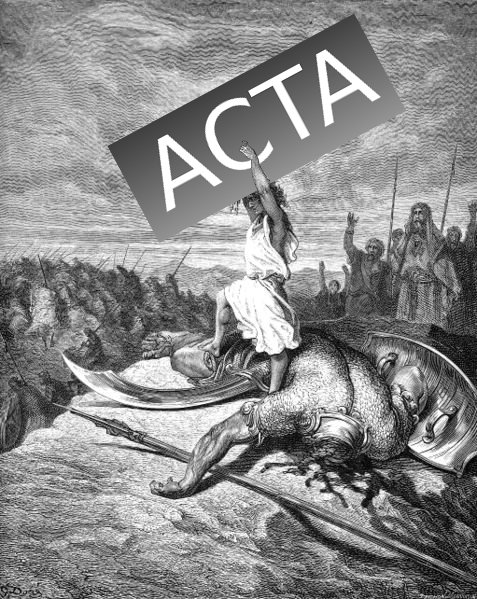

Famous depiction of David vs. Goliath (in the public domain)
Here in a nutshell are some of the latest developments regarding software patents.
The European Commission will formally establish a subgroup of at least eight EU commissioners with a stake in innovation policy when it meets this week.
The EU’s member states have just thrown their weight behind the principles of Open Standards and interoperability. At a meeting of the ministers for telecommunication and information society in Granada, Spain, the ministers of the 27 EU member states yesterday issued the Granada Ministerial Declaration on the European Digital Agenda [pdf].
[...]
FSFE is part of the IGF and has taken part in WSIS while it lasted. A lot of good work was done there, and we’re glad to see that the European member states value the principles of those fora.
Again, this is not the European Commission speaking, but the member states. The Commission itself has been sending mixed messages. In her parliamentary hearing, Neelie Kroes emphasised the importance of Open Standards. On the other hand, the department in charge of the Commission’s IT infrastructre, DIGIT, has been doing all it can to purge Open Standards (not to mention Free Software) from the revised European Interoperability Framework. There are also indications that Neelie Kroes is being pressured to remove references to Open Standards from theDigital Agenda policy paper which she is about to issue.
Noted for its international products and innovation, electronics giant Philips is also a pioneer in patent protection in China, ranking third among foreign companies for its more than 1,600 filings last year alone.
Such large numbers don't surprise industry insiders, as they reflect a worldwide trend - what Ruud Peters, company vice-president and CEO of Philips Intellectual Property and Standards, calls "global patent warming".
In fact overheated patent activity threatens to overwhelm the entire system, he said.
[...]
We have too many patents today and the patent system is facing the risk of being overwhelmed," Peters said.
"Most patent offices have been unable to cope with the steep increase in patent filings and a huge backlog of unexamined applications is building," Peters said. "For a time it was easier to get a patent granted, so the patent quality has decreased."
[...]
Outlandish or bad patents, frivolous lawsuits and high damage awards have triggered a public debate about the functioning of the entire system.
1987: The U.S. Patent and Trademark office announces it will begin accepting patent applications for animals.
Justice John Paul Stevens, who has served on the Supreme Court since 1975, announced on April 9, 2010, that he will retire when the Court completes its current term this summer. This article reviews his contributions to technology related areas of law.
In the letter Mr Matthews concludes that "NZCS represents a broad church of ICT professionals and no doubt some of our members have different views on software patents (as with all things). However in the same way that Section 92a of the Copyright Act was harmful, albeit with the best intentions, the evidence certainly appears clear that software patents are simply too potentially harmful to our sector, and in fact innovation in New Zealand, to support."